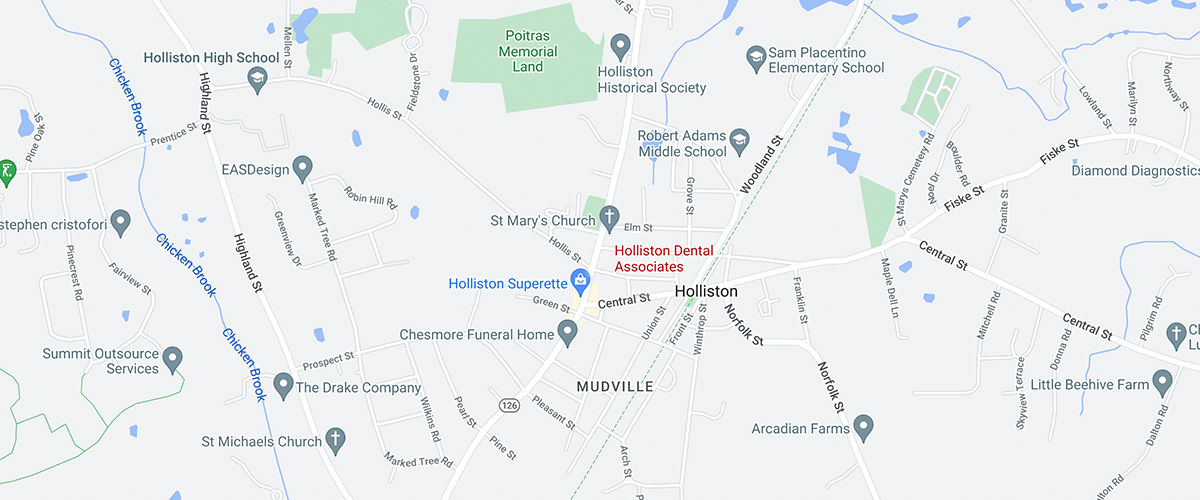August 14th, 2024

Have you ever noticed your attention being instantly drawn to peoples’ teeth when they smile at you? Some people have dull and yellowing teeth, while others have teeth that appear bright white. Everyone’s teeth naturally dull over time because of aging and the contact your teeth have with staining foods, such as chocolate and coffee. However, teeth-whitening treatments can help you keep your teeth white for life.
Get Regular Treatments
The effects of teeth whitening or bleaching treatments are only temporary, so regular treatments at Holliston Dental Associates are necessary to keep your teeth white for life. Bleaching too frequently, though, can wear away your tooth enamel. The effects of in-office bleaching can last for several months to a year, while you may need to repeat your use of at-home bleaching kits every few months to maintain your white teeth. Whitening toothpastes do not contain bleach, so you can use them daily. The American Dental Association suggests asking your dentist for advice on which treatment is best for you.
Have Realistic Expectations
Not everyone’s teeth can be turned bright white, according to the American Dental Association. Your teeth may naturally be a light yellowish color that lends itself well to teeth-whitening procedures, but bleach is not likely to be effective for grayish teeth. Brownish teeth fall somewhere in between.
Practice Good Oral Hygiene
Your teeth whitening efforts will not be as effective if your teeth are in poor health. Visible fillings, implants, or bridges that are metallic stand out against the white color you want to achieve. You can help prevent tooth decay and reduce your risk of needing these unsightly treatments by maintaining a good oral hygiene routine. In addition to brushing your teeth twice a day to remove dirt and potential staining agents, the actions below can promote a healthy mouth.
- Floss every day
- Visit Holliston Dental Associates regularly
- Rinse your mouth with water after each meal and snack
- Limit sugary and starchy foods and beverages, especially between meals
August 7th, 2024

YES! X-rays have been used in dentistry for a long time, and the amount of radiation has significantly decreased with advances in technology. While there is risk in every health diagnostic procedure at Holliston Dental Associates, the benefits must outweigh the risks. Dental X-rays do indeed fall into this category.
X-rays are exposed to a type of film to produce an image. The amount of X-rays required to produce this image differs with film speeds. Speed E or F is highly recommended, and digital X-rays require up to 50% less than speed E or F film. The digital X-ray software can adjust the exposure to produce a quality image. Digital X-rays are becoming a new standard and are most common.
Lead aprons have been used to reduce the amount of scatter radiation. All X-ray units have a cone to focus the X-ray beam so the exposure is highly localized. Lead aprons continue to be worn as a precaution for pregnant women, and a thyroid collar should also be worn. In most cases, this is sewn into the lead apron.
We get radiation exposure from environmental factors as well as healthcare diagnostic and treatment tools. To place this in perspective, in one year a person is expected to have 360mRem per year from the sun, air etc. By comparison, a single set of bitewing X-rays is 0.3mRem. Radiation can accumulate in our body over a lifetime, and additional exposure should be avoided whenever possible.
July 31st, 2024

Recently, multiple studies have concluded that people with sleep apnea, a disorder that causes snoring, fatigue, and dangerous gaps in breathing at night due to throat muscles collapsing, are five times more likely to develop cancer. In fact, one of the studies found that people with the most severe forms of sleep apnea had a 65 percent greater risk of developing cancer of any kind.
Researchers believe this could be due to the body lacking enough oxygen, a condition known as hypoxemia. When people are deprived of oxygen, their bodies react by producing more blood vessels, which can feed cancer cells, and as a result cause tumors to grow and spread.
Approximately 28 million North Americans suffer from sleep apnea, with many cases going undiagnosed. This is due to most cancer patients not mentioning any sleep problems they experience unless their physician asks them.
Patients at Holliston Dental Associates who suffer from sleep apnea can be treated using continuous positive airway pressure (CPAP) therapy, which produces a stream of air to keep the upper airways open while you sleep. An oral appliance may be another option if CPAP therapy isn’t an option. If you have sleep apnea, Dr. Edmond Massabni and our team will help you understand all of your treatment options, finding one that suits your needs.
If you think you may have sleep apnea, please give us a call at our Holliston, MA office to schedule an appointment.
July 24th, 2024

Sealants offer many benefits, but the best is their ability to protect your molars. Molars are full of small caverns that can be the perfect breeding ground for tooth decay and plaque buildup.
Use of protective sealants prevents this buildup from happening. Although children often receive sealants for routine preventive care, they aren’t the only ones who can benefit from this treatment. Sealants can also help adults who have deep canyons or grooves in their teeth.
They are commonly placed on the rear molars that tend to suffer the most decay. Because your molars are used substantially as grinding surfaces, food is more likely to be trapped among them.
Sealant solution consists a composite material that contains bonding agents that seal the top of your teeth. The process is quick and painless, which makes it a great solution for both children and adults who have had trouble with cavities and tooth decay. Sealants also last for several years, and repair is a simple process that can be completed by Dr. Edmond Massabni.
The process of putting sealants on teeth starts with the tooth getting cleaned. We clean it with a type of baking soda spray called sodium bicarbonate. Then acid is etched onto the teeth to rough up the surface.
We apply an alcohol-based liquid to dry the area where the sealant is supposed to go. After it completely covers the surface of the treated teeth, the sealant is cured with a light that makes it hard and long-lasting.
Getting sealants can prevent the possible restorative costs that come from cavities. Sealants help to protect your tooth’s enamel from harmful acids and prevent decay, which can be an investment in itself. The whole process is quick, so it should be easy to schedule an appointment at Holliston Dental Associates.
Feel free to call our Holliston, MA location and we can answer any questions you have about this service.




